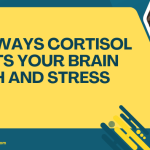Table of Contents
- Introduction
- 1. The Impact of Stress Hormones
- 2. Short-term Memory Impairment
- 3. Long-term Learning Challenges
- 4. Attention and Focus Disruption
- 5. Stress and Brain Health
- Conclusion
- FAQs
Introduction
Stress is a common part of life, but its effects can ripple through our cognitive functions, particularly memory and learning. Understanding how stress affects our brain can empower us to find better ways to cope and thrive. In this article, we’ll explore the top five ways stress can impact your memory and learning ability, providing insights and advice on how to manage these effects effectively.
1. The Impact of Stress Hormones
When we experience stress, our bodies release hormones such as cortisol and adrenaline. These hormones are part of our “fight or flight” response, preparing us to deal with perceived threats. While this response can be beneficial in short bursts, prolonged exposure to high levels of cortisol can have detrimental effects on the brain, especially in areas associated with memory, like the hippocampus.
“Stress hormones like cortisol, while helpful in emergencies, can wreak havoc on our memory if we experience them chronically.”
Effects of Cortisol on Memory
- Hippocampus Shrinkage: Chronic stress can lead to a reduction in the size of the hippocampus, which is crucial for forming new memories.
- Impaired Synaptic Plasticity: High cortisol levels can hinder synaptic plasticity, a process necessary for learning and memory consolidation.
For a deeper understanding of the relationship between stress and cortisol, you can check out this National Institute of Mental Health page.
2. Short-term Memory Impairment
Stress can significantly impair our ability to retain information in the short term. When you’re stressed, your focus is often diverted away from tasks at hand, making it difficult to absorb and recall new information.
“Short-term memory is like a chalkboard—stress can erase what you just wrote.”
How Stress Affects Short-term Memory
| Stress Level | Memory Function | Effect on Learning |
|---|---|---|
| Low | Optimal | Best learning ability |
| Moderate | Slight decline | Potential for minor memory lapses |
| High | Significant decline | Severe memory impairment |
In high-stress situations, you may find it hard to remember simple details, like names or instructions. Techniques such as mindfulness meditation can help mitigate these effects, allowing you to refocus and improve your memory retention. For more insights on managing stress, consider exploring Top 5 Stress Management Techniques for Better Brain Health.
3. Long-term Learning Challenges
While short-term memory issues can be frustrating, stress can lead to long-term learning challenges as well. Chronic stress can alter the way information is processed and stored, leading to difficulties in learning new concepts over time.
“Long-term stress can create a mental block, preventing new knowledge from being fully absorbed.”
Long-term Effects of Stress on Learning
- Decreased Neurogenesis: Chronic stress can suppress the birth of new neurons in the brain, affecting overall cognitive flexibility.
- Difficulty in Retaining Information: Individuals under constant stress may struggle to recall previously learned information, making it challenging to build on existing knowledge.
To combat these long-term effects, consider engaging in regular physical activity and maintaining a healthy diet, both of which can help improve brain function and resilience against stress. For more on lifestyle changes that foster better brain health, check out Top 5 Lifestyle Changes for Better Neuro Health.
4. Attention and Focus Disruption
Stress doesn’t just affect memory; it can also disrupt your attention span. When you’re stressed, your brain is often overwhelmed with information, making it difficult to concentrate on specific tasks. This lack of focus can severely hinder learning processes.
“Stress acts like static on a radio, making it hard to tune into the information you need.”
The Relationship between Stress and Attention
- Inability to Filter Information: Stress can make it hard to prioritize important information, leading to distractions.
- Reduced Cognitive Resources: When your brain is occupied with stress, it has fewer resources available for learning and problem-solving.
To improve focus, try techniques like the Pomodoro Technique, which involves working in short, focused bursts followed by breaks, helping to minimize stress and maximize learning potential. You may also find value in Top 5 Tips for Choosing the Right Neurologist to ensure you are receiving the best support for cognitive health.
5. Stress and Brain Health
Finally, it’s essential to consider the broader implications of stress on overall brain health. Chronic stress can lead to various mental health issues, including anxiety and depression, which can further impair cognitive abilities.
“Just as a garden needs care, so does our brain; neglect can lead to weeds of stress that choke out healthy thoughts.”
Long-term Brain Health Impact
- Increased Risk of Neurodegenerative Diseases: Studies suggest that prolonged stress may contribute to the development of conditions like Alzheimer’s disease. For more on neurodegenerative diseases, see our article on Top 5 Insights into Neurodegenerative Diseases Explained.
- Deterioration of Cognitive Function: Chronic stress can accelerate cognitive decline, affecting not just memory and learning but overall brain function.
To support brain health, prioritize stress management strategies such as yoga, meditation, or simply spending time in nature. These practices can significantly improve your mental well-being and cognitive resilience.
Conclusion
Understanding how stress affects memory and learning is crucial for anyone looking to enhance their cognitive capabilities. By recognizing the impact of stress hormones, short and long-term memory challenges, focus disruptions, and overall brain health, you can take proactive steps to mitigate these effects. Remember, it’s essential to incorporate stress management techniques into your daily routine to maintain a healthy brain and improve your learning ability.
FAQs
1. How can I tell if stress is affecting my memory?
If you find yourself frequently forgetting important details, having trouble concentrating, or feeling mentally foggy, these could be signs that stress is impacting your memory.
2. What are some effective stress management techniques?
Consider practices like mindfulness meditation, regular exercise, spending time outdoors, and maintaining a balanced diet. These can all help reduce stress levels.
3. Can stress cause permanent memory loss?
While chronic stress can lead to temporary memory impairment, it doesn’t typically cause permanent memory loss. However, long-term exposure can have lasting effects on cognitive function.
4. Is all stress bad for memory and learning?
Not all stress is detrimental. Acute stress can sometimes enhance memory and focus in the short term. The key is managing chronic stress.
5. Where can I learn more about the effects of stress on the brain?
You can explore more on this topic through resources like the American Psychological Association and the National Institute of Mental Health.
By understanding and addressing the ways stress impacts memory and learning, you can cultivate a healthier mindset and improve your cognitive performance.






